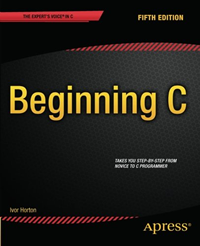Getting started with C programming
Monday 18 November 2013
If you want to make sure that a value cannot be changed, you should declare a constant.
Getting started with C programming
Friday 15 November 2013
In C a variable is declared by stating its data-type (such as int for an integer variable or double for a floating-point variable) followed by the variable name. You can invent names for your variables and, as a general rule, it is best to make those names descriptive.
The C swell gets ever higher
Wednesday 13 November 2013
You might think that an old language like C would long ago have bitten the dust.
Getting started with C programming
Tuesday 12 November 2013
C is one of the most important of all programming languages It was first developed by Dennis Ritchie in the late ‘60s and early ‘70s. The C language is widely used for all kinds of programming: everything from general-purpose applications, programming language tools and compilers – even operating systems and hardware devices. The language also forms the basis of both C++ and Objective-C.
Special Offer!
Friday 8 November 2013
C is one of the most important of all programming languages. You can use it on Windows, OS X, Linux and most other major operating systems. It is a powerful language and good C programmers are always in demand.
Book review
Saturday 2 November 2013
Learning any new programming language can be time-consuming and confusing. On the one hand, if you are a novice programmer, you will have to learn everything from the ground up. On the other hand, if you are already familiar with one or more other languages you may be caught out by subtle differences between the language you are learning and the ones you already know.
Will online learning really replace the ivy-clad groves of academe?
Thursday 3 October 2013
If you have any interest in learning anything at all online, you surely can’t have failed to notice the massive increase in eLearning sites over the past couple of years. Or, as they are known (somewhat uneuphoniously) MOOCs.
Who can you trust?
Sunday 11 August 2013
Should we trust reviews online?
Free video
Wednesday 7 August 2013
I’ve just uploaded a new video in my free series about the fundamentals of programming for beginners.
Great value DTP program
Thursday 25 July 2013
(the world according to YouTube)
Tuesday 9 July 2013
When you upload videos to YouTube, you are prompted to add ’tags’ to identify its subject matter.
Learn the basics
Tuesday 2 July 2013
If you are a novice programmer, you might be interested in the free course that I’m publishing on YouTube.
Multimedia playback software
Monday 1 July 2013
But can it really compete with Word?
Friday 7 June 2013
My latest course
Wednesday 29 May 2013
Book review
Friday 24 May 2013

Beginning C 5th Edition $59.99 / £35.50
by Ivor Horton
APress http://www.apress.com
ISBN-10: 1430248815
ISBN-13: 978-1430248811
Amethyst 2
Tuesday 21 May 2013
My company, SapphireSteel Software, today launched a new version of Amethyst - our professional-grade IDE for Adobe Flash and Flex.
Not to mention the washable!
Thursday 25 April 2013
I’ve fimmally had emough of this danm’ keyboard! Yes, yes, I kmow – I cam’t tell ny ‘m’s fron ny ‘m’s…
Book review
Wednesday 10 April 2013
Flash/HTML5 animation design software
Tuesday 9 April 2013
More..
|
20
|
|
|
|
|
|
|
|